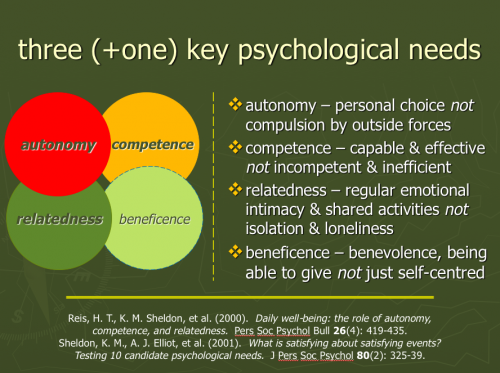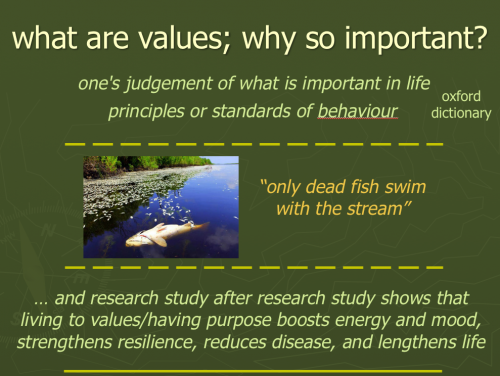Compassion, wisdom & wellbeing training: 1st session content
Last updated on 9th September 2018
I've already introduced this course in an earlier blog post "Compassion, wisdom & wellbeing: an 8 week training". This post gives background for the first session of the training. It will be particularly relevant for participants, but others not coming to the course itself may well find these ideas interesting & helpful. I certainly hope so!
Before our initial meeting, we will have sent participants a link to the "Compassion, wisdom & wellbeing training: course questionnaires" blog post. People will vary in how extensively they want to track their progress over the training, but it's likely to be well worthwhile to give these self-assessment measures a try. This is partly because it's interesting to throw light on what's happening pre- and post- taking a course like this. Probably more importantly though, using the Psychological needs satisfaction measure (NSM) and the Scale of positive & negative experience (SPANE) is likely to be 'therapeutic' in its own right. What we monitor, we tend to pay more attention to (think pedometers or food records). The NSM & SPANE help us focus on key wellbeing-enhancing areas ... the scales can act as a compass to help keep us on track (as well as providing feedback on the progress we're making).
On the first evening itself, our current plan is to start with a general welcome and then a brief outline of the overall eight week structure. This structure is heavily influenced by the research-based, state-of-the-art paper "ENHANCE: Design and rationale of a randomized controlled trial for promoting enduring happiness & well-being". If you follow the link, you can read this article in free full text. Its abstract includes the comment "Individuals who are higher in subjective well-being not only feel happier, they are more likely (to) have fulfilling relationships, increased work performance and income, better physical health, and longer lives. Over the past several decades, the science of subjective well-being has produced insights into these benefits of happiness, and — recognizing their importance — has begun to examine the factors that lead to greater well-being, from cultivating strong relationships to pursuing meaningful goals. However, studies to date have typically focused on improving subjective well-being by intervening with singular constructs, using primarily college student populations, and were short-term in nature ... In the present article, we describe a comprehensive intervention program including 3-month initial treatment followed by a 3-month follow-up ... Our primary outcome is change in subjective well-being across treatment (3 months) and follow-up (6 months). Secondary outcomes include self-report and objective measures of health, as well as a psychological mediators (e.g., psychological needs) and moderators (e.g., personality) of treatment outcomes. We hope to provide researchers, practitioners, and individuals with an evidence-based treatment to improve happiness and subjective well-being." Mm ... what's not to like!
But being nothing less than ... possibly a bit misguidedly ... ambitious, we're not only going to put the best bits of the 12 week ENHANCE training into our 8 week Compassion, Wisdom & Wellbeing course ... we're also going to link across to the Stanford University 8 week Compassion cultivation training. If you follow the link to this Stanford site, you can read more about the CCT training. Roughly half way down the page is a link to a three-page download giving a helpful overview of CCT, including a couple of research studies showing encouraging benefits on compassion & other aspects of wellbeing (compared to waiting list control) ... it's interesting to note that more homework meditation practice was linked to somewhat greater improvements.
So our provisional course outline runs - 1st evening: Self-Determination Theory, Compassion Cultivation, Values; 2nd evening: Roles & Goals, Implementation Intentions, Compassion (this latter will be a strand running over all 8 evenings); 3rd evening: Strengths Use; 4th evening: Wisdom & Self-Compassion; 5th evening: Wisdom & Conflict; 6th evening: Intimacy/Close Relationships; 7th evening: Social Networks & Savouring; 8th evening: Review & Next Steps. As already mentioned, Compassion Cultivation Training is included in every evening.
After the welcome and the general course structure, we plan to use a Mental Contrasting exercise to nudge us all to think about what we'd most want for ourselves personally over this course and the main obstacles that we feel may get in our way. Clicking through to "Mental contrasting: a way to boost our commitment to goals we care about" will get you to a blog post with links & a download about this helpful technique ... and here is a writing sheet for this exercise. Then we'll move into small discussion groups of four (or five) that will meet for support over all eight weeks of the course ... before shifting to a full group introduction.
We'll then outline our planned structure for the rest of the evening ... Orientation, Self-Determination Theory & Needs, Compassion Cultivation Training, the Importance of Values, and the Homework! Orientation will underline four points ... the huge benefits that can come from increasing wellbeing, some facts & figures about how comparatively 'uncommon' high wellbeing is, clarity that change is very possible (with luck or ... with this course, through commitment & hard work), and the importance of a "growth mindset" (here's the "Mindsetworks" website, and here a 10 minute TED talk by Carol Dweck on this important area).
We'll then move on to Self-Determination Theory (S-DT) & Needs. In the earlier blog post on questionnaires, I wrote "One of the two questionnaires we'll be using throughout this training assesses how well we're getting our key psychological needs met. It's based on "Self-determination theory", which is an excellent way of approaching wellbeing and a central theme through the whole of this course. We will be using the recent "Psychological needs satisfaction measure (NSM)". On the back of the sheet, figures from Study 2 down at the bottom of the page give you some idea of how you're scoring compared with what may well be a roughly comparable group of people. To flourish we want to score highly, quite possibly in the top 15% of the population. People who are meeting their needs for Autonomy, Competence, Relatedness & Beneficence strongly will tend to experience higher well-being. Those who are frustrated in trying to meet these needs will tend to experience higher ill-being. It's like monitoring our 'psychological diet'. Tracking how we're doing with these needs and making changes to meet them better is likely to be a very sensible thing to do. It gives us an excellent compass to check whether our lives are on track." Below is a slide illustrating the needs. You can download the four slides we'll be using (First two & second two) - they can be printed out as a 2-miniatures-to-a-page double-sided handout. And here is a link to a 7 minute video clip where I talk through the four slides in more detail.

The plan is that Kirsty will then introduce the Stanford Compassion cultivation training, including teaching a 10 minute practice that we'll be encouraging course participants to practise daily over this next week.
The final section of the evening looks at Values. It's intriguing that the state-of-the-art ENHANCE approach to building wellbeing starts with a focus on Values. A personal way into this area is via the "Respected figures exercise". This way into values asks you to think about people who you deeply respect. They could be people you've known personally or people seen on the media or read about. They could be friends or relatives ... or well-known or historical figures. They could even be fictional characters! The important thing is that you deeply respect at least some aspects of how they have lead their life. And for this evening's particular version of the Respected figures exercise, if you can please choose a couple of people whose respected qualities include characteristics that involve warmth/kindness/generosity/love/compassion. So identify a couple of warm-hearted Respected figures and, in the second column of the worksheet, jot down the qualities you respect them for. What are the personalised words you use to describe their qualities. And, especially around open-heartedness, what are the common themes. This is just to get you feeling into this area.
This downloadable 6-slide Powerpoint sequence (that I print out as a 6-miniatures-to-a-page black & white handout) highlights the importance of values. Below is an illustrative slide and here a link to a 10 minute video giving more information on the slides. There are good reasons to think that values, that are particularly likely to build wellbeing, involve a balance between cooperation & kindness for others and also autonomy & self-direction for oneself. Research highlights how living to values strongly benefits life expectancy, physical health, psychological resilience, and overall wellbeing (for more on some of these research studies, go to the "tag cloud" and click on "values" or "meaning" or "goals" to get through to posts like "Purpose in life: reduces dementia risk, increases life expectancy, treats depression and builds wellbeing").

Thank you for reading through this material. It can be very helpful. Now please look at the next post "Compassion, wisdom & wellbeing: 1st session home practice".
